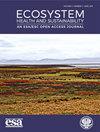Food waste and associated carbon footprint: evidence from Chinese universities
IF 3.4
2区 环境科学与生态学
Q1 ECOLOGY
引用次数: 7
Abstract
ABSTRACT In recent years, there has been widespread concern regarding the carbon footprint (CF) of food waste due to the key impact of CF on climate change, particularly as China’s food waste is rising with its economic development. China has the largest scale of higher education in the world, and the amount of food waste in university canteens is considerable and cannot be ignored. This study attempts to assess the carbon footprint (CF) of food waste at Chinese universities for the first time based on a national survey. It is estimated that 1.55 million tons of food were wasted in Chinese university canteens in 2018, based on 9,192 samples covering 29 provinces in China. The associated CF was 2.51 Mt CO2eq. The top two food categories contributing to the total CF were meat and grains, accounting for 46.28% and 36.52%, respectively. Furthermore, the location of the university was significantly associated with the CF of plate waste. It also indicated that household income, meal satisfaction, sex, education, meal days, and food-saving campaigns were important factors influencing the CF of food waste. This study highlights areas that can help reduce the environmental impact of plate waste. It also provides targeted measures to reduce the associated CF of food waste in Chinese universities.食物浪费和相关的碳足迹:来自中国大学的证据
摘要近年来,由于碳足迹对气候变化的关键影响,特别是随着中国经济的发展,食物浪费日益增加,人们普遍关注食物浪费的碳足迹。中国是世界上高等教育规模最大的国家,大学食堂的食物浪费量巨大,不容忽视。本研究首次尝试在全国调查的基础上评估中国大学食物垃圾的碳足迹。根据覆盖中国29个省份的9192个样本,估计2018年中国大学食堂浪费了155万吨食物。相关CF为251 Mt二氧化碳当量。占CF总量的前两大食品类别是肉类和谷物,分别占46.28%和36.52%。此外,大学的位置与板材废料的CF显著相关。研究还表明,家庭收入、用餐满意度、性别、教育程度、用餐天数和节约食物运动是影响食物浪费CF的重要因素。这项研究强调了有助于减少板材废料对环境影响的领域。它还提供了有针对性的措施来减少中国大学食物浪费的相关CF。
本文章由计算机程序翻译,如有差异,请以英文原文为准。
求助全文
约1分钟内获得全文
求助全文
来源期刊

Ecosystem Health and Sustainability
Environmental Science-Management, Monitoring, Policy and Law
CiteScore
7.10
自引率
2.00%
发文量
40
审稿时长
22 weeks
期刊介绍:
Ecosystem Health and Sustainability publishes articles on advances in ecology and sustainability science, how global environmental change affects ecosystem health, how changes in human activities affect ecosystem conditions, and system-based approaches for applying ecological science in decision-making to promote sustainable development. Papers focus on applying ecological theory, principles, and concepts to support sustainable development, especially in regions undergoing rapid environmental change. Papers on multi-scale, integrative, and interdisciplinary studies, and on international collaborations between scientists from industrialized and industrializing countries are especially welcome.
Suitable topics for EHS include:
• Global, regional and local studies of international significance
• Impact of global or regional environmental change on natural ecosystems
• Interdisciplinary research involving integration of natural, social, and behavioral sciences
• Science and policy that promote the use of ecological sciences in decision making
• Novel or multidisciplinary approaches for solving complex ecological problems
• Multi-scale and long-term observations of ecosystem evolution
• Development of novel systems approaches or modeling and simulation techniques
• Rapid responses to emerging ecological issues.
 求助内容:
求助内容: 应助结果提醒方式:
应助结果提醒方式:


